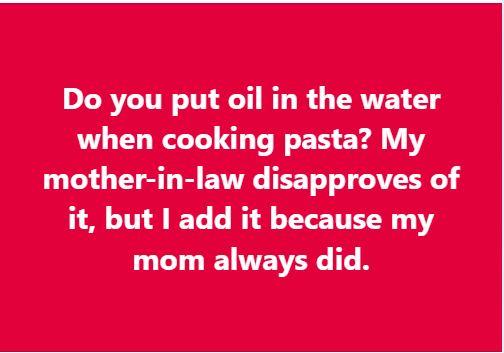It seems like you’re asking for an article, possibly about the practice of adding oil to pasta water. Here’s a brief article on that topic:

It seems like you’re asking for an article, possibly about the practice of adding oil to pasta water. Here’s a brief article on that topic:
**Should You Add Oil to Pasta Water? The Debate Explained**
Cooking pasta is a simple process, yet there’s a longstanding debate that divides many home cooks and even professional chefs: should you add oil to the water when cooking pasta? While some swear by it, others strongly disapprove. Let’s dive into the arguments on both sides and see where the tradition originates.
**The Case for Adding Oil**
Many people add oil to pasta water to prevent the noodles from sticking together. This practice is particularly common in households where large batches of pasta are cooked at once. The belief is that a thin layer of oil on the surface of the water will coat the pasta, making it less likely to clump. Additionally, some cooks feel that the oil adds a subtle flavor and sheen to the noodles.
This method is often passed down through family traditions. As noted in the text, one person continues to add oil because their mother always did, even though their mother-in-law disapproves. Such culinary habits are deeply rooted in personal and cultural cooking practices, making them hard to break.
**The Case Against Adding Oil**
On the other side of the debate, many chefs and pasta experts advise against adding oil to the water. The primary argument is that oil prevents sauces from properly adhering to the pasta, which is a crucial part of achieving the desired flavor and texture in many dishes. When oil is added to the water, it can create a barrier on the pasta that makes it slippery, causing the sauce to slide off rather than clinging to the noodles.
Instead of adding oil, these experts recommend stirring the pasta frequently during the first few minutes of cooking, which should prevent sticking without compromising the pasta’s ability to absorb sauce.
**The Middle Ground**
For those who find themselves in the middle of this debate, there’s a compromise. If you’re cooking pasta that will be used in a salad or another dish where the pasta will be served cold, adding a small amount of oil after draining the water can help prevent sticking as it cools. However, if the pasta will be served hot with sauce, skipping the oil during the cooking process might be the better choice to ensure your sauce clings beautifully to each strand.
**Conclusion**
Whether you add oil to your pasta water or not largely depends on personal preference and the dish you’re preparing. While tradition plays a significant role in how we cook, understanding the reasons behind each method allows us to make informed choices in the kitchen. Ultimately, the best approach is the one that works for you and delivers the most satisfying meal.
—
Let me know if you need more detailed information or any specific insights!




